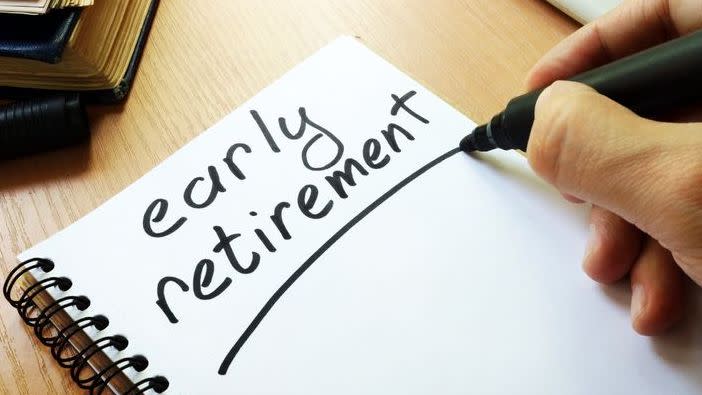I’m a 48-Year-Old Divorcee With $550K in an IRA and $110K in My 401(k). Can I

Planning for an early retirement requires wrestling with complex variables, including healthcare costs, portfolio returns and withdrawal rates. As a 48-year-old divorcee with a $550,000 IRA and $110,000 in a 401(k), it may be possible to retire in 10 years. Making reasonable assumptions, these assets could potentially generate enough income to maintain an adequate living standard. But there are some important caveats to consider before assuming this is what will happen. If you’re planning to retire in the coming years, consider speaking with a financial advisor and creating a plan for getting there.
Early Retirement Calculations
Retiring early requires you to have enough money saved so that you can cover your living expenses for the rest of your life. One way to approach this is to start with your withdrawal rate. The 4% rule offers a starting point, suggesting portfolios can dispense 4% of savings annually, adjusted for inflation, for at least 30 years.
Projecting a successful retirement also requires you to estimate future expenses as well. Healthcare expenses, in particular, are tricky to model and can represent a significant obstacle to a comfortable retirement. And early retirees must pay for private health coverage themselves before Medicare eligibility at 65.
Life expectancy is also a key concern since your nest egg has to last for the rest of your life. According to the Social Security Administration’s Period of Life Table, 60-year-old men and women can expect to live to 80 and 83, respectively. Your own experience may vary, however. And the longer you live, the greater the chance you’ll outlive your savings.
Accounting for these variables can be challenging but a financial advisor can help.
Running Your Numbers

Imagine that you have $550,000 saved in an IRA and $110,000 in a 401(k) and want to retire in 2034 at age 58. Let’s start with withdrawals. In a decade, assuming a 4% annual rate of return, your combined $660,000 in retirement accounts could grow to about $976,961, assuming a very modest 4% annual rate of return.
Applying the 4% rule to your projected $976,961 portfolio balance suggests you could safely withdraw $39,078 in your first year of retirement. Withdrawals from 401(k) and IRA plans before age 59.5 generally are subject to a 10% penalty, which would reduce your withdrawals to $35,171.
This amount of income may not support the lifestyle you’re accustomed to. Many retirement planners recommend replacing between 70% and 90% of your pre-retirement income through portfolio withdrawals, Social Security and other income sources. Assuming you earn the median salary for people between 55 and 64 years old ($63,544), the 70% guideline suggests $44,481 would be enough retirement income for you. Withdrawing only $35,171 leaves you $9,310 short of this mark.
Down the Retirement Road
Your financial situation could improve within a few years after retirement. By age 59.5, you won’t be charged the 10% early withdrawal penalty. That will add $3,908 to your annual income (not accounting for potential portfolio growth).
By age 62, you’ll become eligible for Social Security benefits, which would be worth an estimated $2,372 per month. This would add about $28,469 to your annual income. At this point, your income from retirement accounts and Social Security would total $67,548. (This assumes you would keep your withdrawal static and not adjust it for inflation each year, as the 4% rule dictates.)
A few years after that, you’ll become eligible for Medicare at 65. This will likely reduce your health insurance costs compared to paying for private health insurance. But if you need additional help making retirement income projections, consider getting expert advice from a financial advisor.
Early Retirement Adjustments

Averages may not apply to your individual situation, so estimate your personal retirement expenses by preparing a budget including housing, food, health insurance, transportation and other major expenses. You may be spending less than the average person on these items. You may be able to reduce living costs by relocating to a less expensive city, especially one where housing costs less.
You could also opt to have a less costly lifestyle, no matter where you live. The 70% of pre-retirement income benchmark is just a guideline. Your lifestyle could require only 55% of your pre-retirement income. Using that benchmark, you could fund a secure retirement on $34,949 a year, which is less than your projected withdrawals.
Adding income in retirement is another possibility. Working part-time for a few years could cover…
Read More: I’m a 48-Year-Old Divorcee With $550K in an IRA and $110K in My 401(k). Can I

